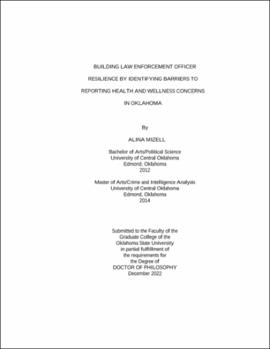| dc.contributor.advisor | Li, Dale | |
| dc.contributor.author | Mizell, Alina | |
| dc.date.accessioned | 2023-07-05T20:56:41Z | |
| dc.date.available | 2023-07-05T20:56:41Z | |
| dc.date.issued | 2022-12 | |
| dc.identifier.uri | https://hdl.handle.net/11244/337863 | |
| dc.description.abstract | This exploratory, mixed methods, study was informed by the interpretivist paradigm using Grounded Theory to identify barriers to reporting health and wellness concerns to higher command by law enforcement officers. The foundational principle starts with organizational behavior in emergency services with a focus on law enforcement. Current research has documented that a law enforcement officer’s resilience, and ultimately an agency’s, is dependent upon a plethora of factors, one of which is health and wellness. Though law enforcement stress and trauma have been well documented, the underlying factors on officer outreach, or lack thereof, is not as investigated in the literature. Therefore, to increase an officer’s resilience, one must analyze it through such identification of barriers. The study aims to “Critically evaluate the barriers to reporting health and wellness concerns to higher command experienced by local law enforcement officers in Oklahoma” employing a mixed methods approach. This used 9 field interviews with various law enforcement command at the selected agencies to identify the current programs and tactics used to increase officer health and wellness. Additionally, a series of 91 survey questionnaires were administered to different local law enforcement officers from same participating agencies in Oklahoma. The results retrieved from those field interviews were incorporated into the officer questionnaires. The analysis of data was accomplished using the Atlas.Ti computer software for the interviews, and the Statistical Package for the Social Sciences (SPSS) for the questionnaire. Findings identified current barriers experienced by law enforcement officers in reporting health and wellness concerns such as illnesses, negative coping mechanisms, mental health concerns, leadership barriers, among others, and solutions to overcome such barriers based on current best practices from an interdisciplinary approach (fire, medical services, counseling, and others). The goal is to increase officer and, overall, organizational resilience. | |
| dc.format | application/pdf | |
| dc.language | en_US | |
| dc.rights | Copyright is held by the author who has granted the Oklahoma State University Library the non-exclusive right to share this material in its institutional repository. Contact Digital Library Services at lib-dls@okstate.edu or 405-744-9161 for the permission policy on the use, reproduction or distribution of this material. | |
| dc.title | Building law enforcement officer resilience by identifying barriers to reporting health and wellness concerns in Oklahoma | |
| dc.contributor.committeeMember | Murphy, Hailey | |
| dc.contributor.committeeMember | McAleavy, Tony | |
| dc.contributor.committeeMember | Nemeth, Stephen | |
| osu.filename | Mizell_okstate_0664D_17899.pdf | |
| osu.accesstype | Open Access | |
| dc.type.genre | Dissertation | |
| dc.type.material | Text | |
| dc.subject.keywords | first responder resilience | |
| dc.subject.keywords | health and wellness | |
| dc.subject.keywords | law enforcement resilience | |
| thesis.degree.discipline | Fire and Emergency Management Administration | |
| thesis.degree.grantor | Oklahoma State University | |
